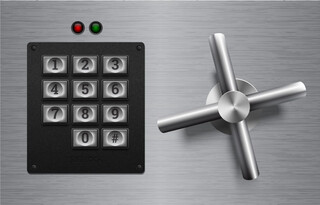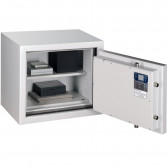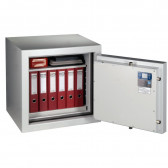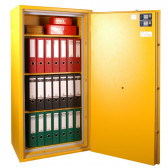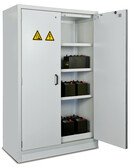Are you going to invest in the security of your values and buy a safe? One of the issues for you will therefore be the subject of the lock. Which lock should you choose? Which lock for a safe will be the best? In this article, we will discuss the different types of locks used in safes and point out their advantages and disadvantages so that, once you have read the text, choosing a particular lock will be quick and easy.
A crucial element of a safe, and an important determinant of the effectiveness of the entire product, is precisely the lock, which is designed to prevent unauthorised access. A variety of locks can be used in safes. Their choice depends on many factors, such as the level of security, ease of use and cost. Much also depends on the parameters of the particular safe, such as its size (not every model can use the lock of your choice).
Types of safe locks
Safe locks are a fundamental part of a safe that determines its security. There are different types of safe locks, such as key locks, mechanical combination locks, electronic locks and biometric locks. Each of these types of locks has its own advantages and disadvantages, which we will discuss below. Choosing the right lock depends on each user's individual needs and preferences, but also on the budget you have for buying a safe.
Key lock
The key lock is the simplest, most standard and also the oldest type of lock used in safes. It works on the principle of mechanical locking, which opens when a matching key is inserted. When you buy a safe, you will receive a set of 2 or 3 keys (depending on the safe model).
Advantages of key locks:
- • They are easy to use: just turn the key, the handle and you have access to the safe.
- • They are the cheapest of all the locks available.
- • There is no need to power such a lock, they operate without batteries or any other energy source; therefore, it can be said that they are the most eco-friendly solution.
- • Key locks are virtually faultless.
Disadvantages of key locks:
- • There is a risk of losing the key or someone may steal it from you.
- • Some customers perceive them as inconvenient (the key is at least several centimetres long).
- • After all, it is another key or keys that have to be plugged into the bunch of keys you currently have.
- • Someone can copy the key.
Mechanical combination lock
When the phrase ‘combination lock’ is uttered, it is already clear that it is the one with the knob, the most ‘spectacular’, the hero of American films. This is how to advertise the mechanical combination lock with a wink. It is more sophisticated compared to a key lock. It requires the precise setting of the right combination of numbers on the cipher dial and this is how you open the safe.
Advantages of combination locks:
- • It has a higher level of security compared to a key lock.
- • There is no need to power such a lock – it is also environmentally friendly.
- • No key that can be lost, stolen or copied.
- • It is faultless – there is no way to block this lock.
Disadvantages of combination locks:
- • It can be difficult to use as it requires precision in setting the digits on the dial.
- • It has a longer opening time compared to other locks.
- • If one of the digits is inadvertently twisted further, the entire opening cycle has to be repeated once more.
Check out more: Which combination lock safe to choose?
Electronic lock
The electronic lock works by entering a code on a keypad to open the safe. It is very popular because of its simplicity of use and the ability to open the safe quickly.
Advantages of electronic locks:
- • They are easy to use and program.
- • You can get into the safe quickly.
- • They have the ability to change the set code or codes.
- • They are battery-powered (which can be a disadvantage at the same time – as a not very environmentally friendly solution).
- • They have the possibility of an external battery connection even if the one supplying it is completely discharged.
Disadvantages of electronic locks:
- • You have to remember the PIN code, otherwise you will not get into the safe (there are exceptions to this rule, which you will read about below).
- • You need to have batteries in reserve.
- • Installing an electronic lock in a safe incurs a higher price. There is a surcharge for an electronic lock.
In addition, an electronic lock has certain functions that neither a key lock nor a combination lock has. What are these functions? First of all, it has the possibility of setting up several or even dozens of users. Some locks are additionally equipped with an audit option (verifying which user opened the safe and when). An electronic lock can have a time delay function (1-99 minutes – the time you have to wait after entering a wrong code until the lock can be opened). It can also have an alarm code opening function (so-called silent alarm) and an emergency key opening function – a very interesting solution (in case the PIN code is forgotten, the safe can be opened with a mechanical key lock).
Biometric lock
The biometric lock is the most advanced and modern solution, which utilises the unique biological characteristics of a user, i.e. most often fingerprints.
Advantages of biometric locks:
- • It has a very high level of security, you use the lock solely by reading your fingerprint.
- • You do not need to carry or hide the key, memorise the cipher or PIN.
- • You open the safe quickly and easily.
- • It has the ability to enter up to 100 users.
- • It is powered by 12V current – power supply included.
- • It has a battery backup opening option in the event of a power failure.
Disadvantages of biometric locks:
- • The biometric lock is the most expensive of the locking options available.
- • People with hands that sweat or are easily injured (e.g. due to their profession) may find it difficult to use this type of lock.
How to choose the best lock for a safe?
Choosing a lock for a safe is a combination of several factors. Certainly the question of convenience and preference is important. For some customers, the lowest price is most important and then they choose key locks.
You definitely should take the type of safe, its contents and the number of people who will be using it into account (e.g. a key lock comes with 2 or 3 keys, but you can order more from us if you wish).
Here are some key aspects to consider:
• Security: for places requiring the highest level of security, such as banks or military establishments, biometric locks or smart locks with advanced security features will be the best choice.
• Ease of use: for homes or offices where access to the safe must be quick and easy, electronic or combination locks will be ideal.
• Cost: key locks are the cheapest and usually included in the price of the safe, which can be important when budgets are tight.
• Maintenance and service: electronic and smart locks require regular maintenance, including changing batteries. This needs to be kept in mind.
The future of safe locks
The development of technology undoubtedly also affects our industry, the security industry. We can expect locks to continue to develop; they will become more and more advanced and therefore more secure. A recent innovation from HARTMANN TRESORE (but it is a lock that is not yet certified) is SCLAK, which offers an even higher level of convenience, as it gives you the possibility to open a safe (or a door) via an application installed on your smartphone.
Summary
Locks on safes are a key element in securing and therefore protecting valuable items. Choosing the right lock depends on the needs of the user, the level of security and the budget allocated to the purchase of the safe. From traditional key locks through to combination locks and advanced biometric and smart locks, we offer a wide range of solutions to meet a variety of requirements. As technology develops, we can expect increasingly sophisticated and integrated security systems to provide even greater protection for our values deposited in safes and secured with high-end locks.
